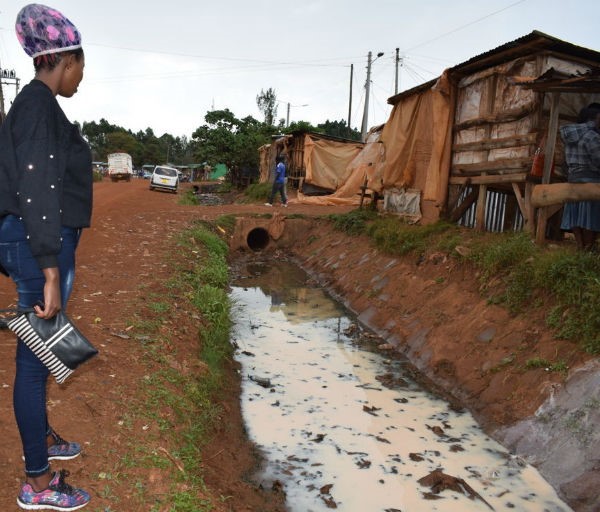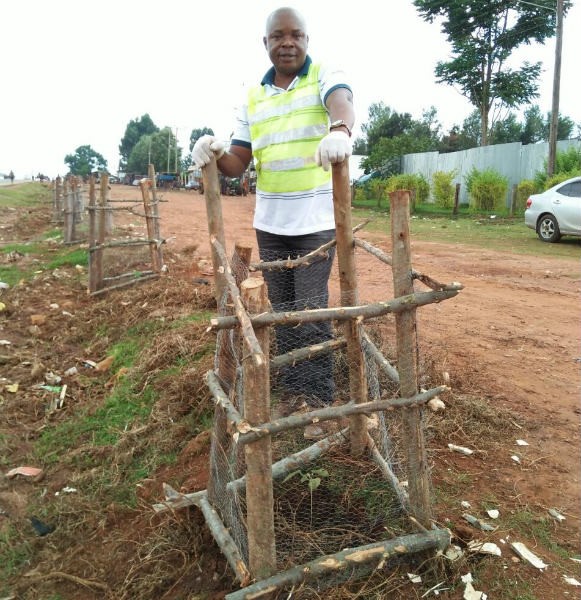In just a few weeks, Trans Nzoia County will have completed phase one of its projects under SymbioCity Kenya. This will make Kiminini Town a more tranquil environment: cleaner with better waste management, greener with more trees, and benches installed at strategic places. SymbioCity Kenya Communications brings this report from Kiminini Town.
“We are so excited about our project. We have the support of the county government and the community, and feel indebted to them. Our team is just great… eager to offer our service. We want to see progress in Kiminini, and replicate the project in other areas,” enthuses the Pilot project’s Coordinator, Dennis Nyukuri.
His team has just installed five benches in the busiest and most deserving parts of Kiminini and are replanting 500 trees across the town, as part of the project’s phase one, referred to as “quick win”. Animals and drought destroyed 500 trees planted in 2017.

A Kiminini resident views the newly installed bench
“From lessons learnt, we’ve invested more on mitigation measures… The tree holes are now 1 foot in diameter by 11/2 feet deep to retain more water. We will also have three posts around the holes with kuku (wire) mesh wrapped around to keep off animals,” discloses Dennis. Neighbouring schools will adopt and water the trees.
Changing behaviour to improve waste handling
Waste management in the town is being implemented in many phases, and hinges heavily on continuous community sensitisation, a crosscutting component of the project. Sensitisation has so far involved schools and pockets of the community. It includes training on waste separation and collection, for a group of youth who will recycle used paper into khaki paper and envelopes; and farmers and other groups to handle composting.
Already 50 single chamber and 25 double chamber litterbins are being installed across the town to reduce random littering, and boost waste separation.
Keen on knowledge exchange and management in the culturally rich town, the project team will also create a community resource centre with access to Internet. A community cooker will also be installed at a local secondary school, to serve as an incinerator, absorbing all types of waste.
Public green space, accessibility, toilets, and drainage
As soon as this phase of implementation is complete, the project will start to scale-up. Community sensitisation will involve more schools and community members. More benches will be erected in more public places; and more green spaces will be created. A consultant is already training the project team on how to create more green spaces.
“I already see Kiminini demonstrating to other towns that creating green spaces does not necessarily need large spaces,” says project member, and environmental planner, Faith Muthoni.
The project will also start restoration of drainages in the town, by redoing and redesigning existing ones. Some of the drainages were poorly installed, and cause massive flooding in the rainy season. The project will also create footbridges to enhance movement for the physically challenged.

A dysfunctional drainage in Kiminini Town
This phase will also include a water and sanitation component that involves recycling of used water and harvesting of rainwater in select schools and public areas. Two public toilets will be fitted with a water-recycling machine (eco-cycle), and will be beautified with a mini-park. Water tanks will be installed in Kiminini, Masaba, St. Vincent’s and St. Bridgid’s Primary Schools, and in select government offices to harvest rain water hence reducing shortage of the commodity and improving hygiene.

Pilot Coordinator Dennis planting trees as part of the project’s “Quick Win” phase
A team from Trans Nzoia County travelled to Nairobi to learn about sustainable waste handling solutions. Read about their study trip here!Your text to link…
Kiminini conducted a participatory Urban Sustainability Review and developed a vision for the town’s development. Find short and long versions of the report here!
Top photo: Faith Muthoni, Environmental Planner checks if the community uses the county installed waste bins

